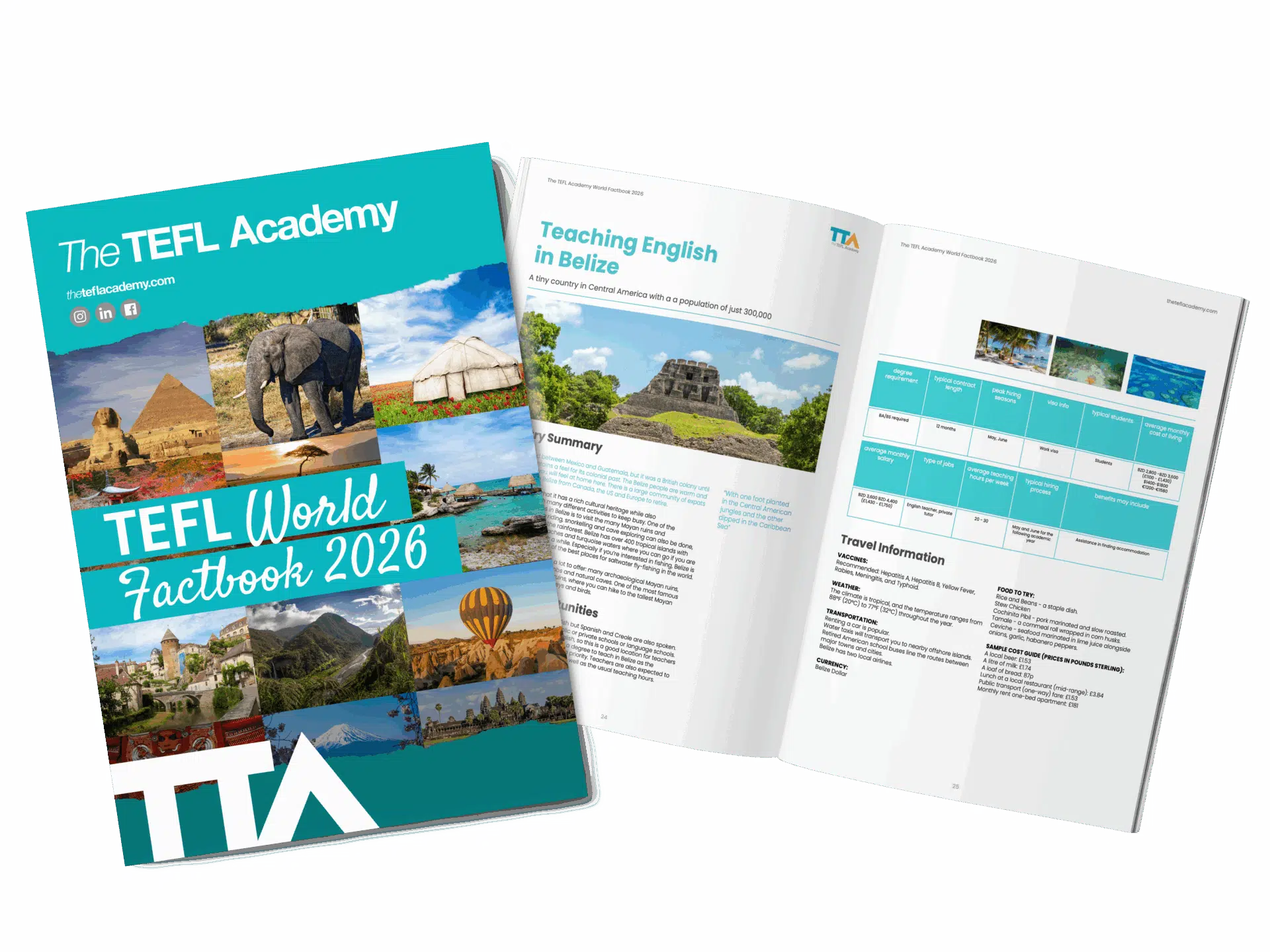Teach English in India
a world of opportunities
Join a global community of over 200,000 TEFL teachers working throughout the world! Enrol me!
Contents
Why Teach In India
Places To Teach
Visa requirements
Teaching experience
TEFL certificate
Degree requirements
Non-native speakers
Startup capital
Types of jobs
How to get a job
Average teacher salary
Common benefits
Cost of living
Life and culture
Are you looking for an adventure where you can visit amazing palaces and holy temples and learn about incredible religions? Do you want to visit tea plantations and spice markets and eat delightful meals? If you want to explore history and architecture and experience warm and friendly people, then India is the place for you.
If you are ready to have a complete culture shock experience then you have to start looking for a TEFL job in India.
Why Teach English In India?
Teaching English in India allows you to make a difference in students’ lives. Teachers who teach in India definitely don’t do it for the money – there are few to almost no paying TEFL positions available in India. This fascinating country is an excellent place where teachers can volunteer and where newer teachers can gain experience.
What can you expect from teaching in India?
- A good work-life balance: Teachers work between 20 and 40 hours a week. Most schools are laid-back and friendly. As a volunteer, you can have a shorter work week which will allow you ample time to travel and explore.
- Culture shock: India is unlike any place in the world – it is a burst of colour, noise and beauty! It is this culture shock that makes India such an astonishing, life-changing country to visit.
- Travel opportunities: India is a vast country. While teaching in India make sure you explore the amazing cities like Delhi or Mumbai and the wilderness of jungles, deserts, and mountains. You won’t be able to get enough of this beautiful and diverse country.
- The cuisine: The food in India is amazing and very affordable. You will be spoilt by mouth-watering cuisines and dishes around every corner. Indians love food and they love to treat visitors to their amazing delicacies.
Best places to teach English In India
Even though English is widely studied in India, the demand for English teachers is very low. Few state schools can afford to hire foreign teachers. There are, however, plenty of voluntary positions available in India. If you are looking for a paid position we suggest you look at the cities mentioned below.
New Delhi
For teachers who like the hustle and bustle
New Delhi is the capital of India. If you’re looking for a vibrant city filled with young people and pulsing nightlife, then New Delhi is the spot for you. New Delhi is known for its shopping malls and amazing markets. It offers beautiful colonial-era parliament buildings, art galleries, history, and science museums and landscaped parks. The students you teach in New Delhi will most likely come from a middle-class family, with more money than the average Indian.
Mumbai
A city of contrasts
Mumbai lies on the Konkan coast on the west coast of India. It’s known as the financial and commercial hub of India. This is a city of contrasts: here you will see slums and luxury homes, hard-working labourers and millionaires, skyscrapers and tropical forests. Mumbai is one of the most populated cities in the world and teachers might feel overwhelmed by the amount of people and heavy traffic of the city. Most of India’s international schools are located in Mumbai.
Goa
A beach getaway
Goa is a state on the southwestern coast of India. It is a beautiful gem of a city with golden-sand beaches, coconut groves and dense forests. The city is a former Portuguese colony and you will see Portuguese touches all over Goa. Here you will experience an easy-going culture, with friendly people, great food and music. In Goa there is something for everyone, from meditation on the beach to an exciting nightlife. Teaching in Goa will definitely be an unforgettable experience.
Do you need a visa for teaching English in India?
Yes, you do. If you want a paid teaching position in India, you have to apply for a work visa from the Indian embassy in your home country before leaving for India. Some schools may pay for your visa application costs and assist you with the process. However this differs from school to school.
Do I need previous teaching experience?
Having prior teaching experience is needed for a paid teaching position in India. Voluntary programmes will accept teachers without teaching experience but it’s important that you have a TEFL qualification.
Which TEFL certificate do I need to teach in India?
Most schools in India require you to have a TEFL certificate to teach English in India. If you are serious about teaching English in India then the best thing you can do is get yourself TEFL-qualified with a TEFL certificate that has a minimum of 120 hours.
The TEFL Academy is the perfect place to get qualified and the first step to finding that perfect job in India. Getting your TEFL certification through The TEFL Academy will put you on track to teach in India.
Can I teach English in India with no degree?
You need a Bachelor’s degree to teach English in India. Your degree does not have to be in English or Education, any field will do. If you choose to volunteer some programs might take you without a degree.
Can non-native speakers teach English in India?
Yes, you can! India is one of the countries known for allowing non-native speakers to teach and volunteer for TEFL teaching programmes.
How much start-up capital do I need?
Start-up costs are the basic costs you will need to survive from when you arrive in India until you receive your first paycheque. Most schools in India will not pay you upfront, so it is important to have between INR 60,000 – INR 80,000 ($700 – $1, 000 USD) available to set yourself up in India. Below is a breakdown of costs you might incur to start off in India:
- Accommodation: First month’s rent and a security deposit.
- TEFL certification: A TEFL course can cost between $100 and $500, depending on the length and level of the course and the course provider.
- Document fees: Any costs related to certifying and notarising your degree and TEFL certificate.
- Flight ticket: Variable.
- Visa application: Approximately
- Living expenses: You will need one month’s worth of start-up capital of about $725 – $1,000 to help you settle in India.
Types of English teaching jobs in India
Public schools
It is almost impossible to find a teaching position at a public school in India. English is one of the official languages spoken in India and many locals are able to teach the language in public schools. Schools just don’t have the funds available to hire foreign teachers. Foreigners also find it difficult to survive on the low salaries that teachers earn in India.
Private lessons
India is becoming a hub for customer service representatives and information technology specialists who are outsourced by American companies. TEFL teachers can set up private lessons for individuals in these industries who want to improve their English. Teachers should look into jobs for TEFL trainers at call centres where teachers are tasked with helping employees develop an American accent while talking on the phone.
International schools
International schools are located in big cities like Mumbai and New Delhi. These schools are attended by wealthy students and the requirements to teach there are very strict. Teachers need a teaching qualification from their home country. International schools prefer teachers from Britain, Australia and Canada.
How to get English teaching jobs in India
- Paid positions are mostly found in big cities like Mumbai, Delhi, Jaipur, Nagpur, Shimoga, Bijapur, Nagercoli, and Bangalore.
- It is recommended that you arrive in India with a job offer in hand. This will help you get a working visa or resident permit. Some schools may assist you with this.
- Most paid positions are advertised in English newspapers in India. Potential teachers should look on their websites for positions. In India, schools prefer to do a telephone interview with candidates after you submit your resume online.
Keep an eye on The TEFL Academy’s internships and volunteer programs for opportunities in India.
What is the average teaching English salary in india?
Remember that the majority of teachers volunteer in India. If you are able to find a paid position, teachers can expect to earn between INR 10,000 – INR 80,000 ($150 – $1,000 USD) a month teaching in India.
What are the common benefits for teachers in India?
Teachers don’t receive a lot of benefits as part of their packages in India. Benefits might include the following:
- Accommodation is sometimes included.
- Up to 10 paid vacation days per year if you work at an international school
- Assistance with securing a work visa
Volunteer programs offer a basic living allowance and accommodation.
What's the cost of living in India?
Teaching salaries in India are much lower than most countries and foreigners are paid the same low wages as locals. It is important to remember that the cost of living is extremely low in India. You may not be able to save but you will enjoy a comfortable lifestyle.
Here are the common costs for living in India:
Accommodation
- One-bedroom apartment in city centre: INR 15,000 ($180)
- One-bedroom apartment outside city centre: INR 10,000 ($120)
Utilities
- Electricity, water, and gas: INR 5,500 ($65)
Food and groceries
- Monthly shop: INR 5,000 ($60)
- Meal at an inexpensive restaurant: INR 200 ($2.50)
Transport
- Monthly pass: INR 1,200 ($14)
Internet
- Unlimited: INR700 ($8)
Entertainment
- Gym, cinema, going out: INR 8,200 ($100)
What's it like to live and work in India?
- India will be an adventure of a lifetime, but it might not be for everyone. Life in India is loud, crowded, often stressful and uncomfortable, but for some TEFL travellers that is part of the fun.
- When moving to India teachers might be overwhelmed by a complete sensory overload. India is very densely populated and there are a lot of people. Don’t expect to have any personal space, especially on public transport or on the streets in big cities.
- The climate is something to get used to as it is very warm and humid in India.
- Western teachers arriving in India might be shocked by the extreme poverty, as well as the big difference between the rich and poor. To survive the extreme culture shock in India it is important to do a lot of research before you travel to India.
- Teachers are treated with a lot of respect in India and you will find your students extremely hard-working and kind. Because of religious traditions teachers are expected to dress conservatively in the classroom.
- The food in India is really amazing. Don’t let the idea of Delhi belly prevent you from trying all the wonderful food India has to offer. Food is really affordable.
- Travelling in India is a whole different story. Public transport is cheap but extremely crowded. Taking a taxi is also cheap, but the traffic in India is really heavy and takes some getting used to. Even walking and crossing roads might be a challenge at first in India.
India is a country filled with incredible people, wonderful diversity, amazing people and wonderful food. Teaching in India you will surely fall in love with this country.
Start your teaching journey with an accredited TEFL course provider.
Contents
Are you looking for an adventure where you can visit amazing palaces and holy temples and learn about incredible religions? Do you want to visit tea plantations and spice markets and eat delightful meals? If you want to explore history and architecture and experience warm and friendly people, then India is the place for you.
If you are ready to have a complete culture shock experience then you have to start looking for a TEFL job in India.
Why Teach English In India?
Teaching English in India allows you to make a difference in students’ lives. Teachers who teach in India definitely don’t do it for the money – there are few to almost no paying TEFL positions available in India. This fascinating country is an excellent place where teachers can volunteer and where newer teachers can gain experience.
What can you expect from teaching in India?
- A good work-life balance: Teachers work between 20 and 40 hours a week. Most schools are laid-back and friendly. As a volunteer, you can have a shorter work week which will allow you ample time to travel and explore.
- Culture shock: India is unlike any place in the world – it is a burst of colour, noise and beauty! It is this culture shock that makes India such an astonishing, life-changing country to visit.
- Travel opportunities: India is a vast country. While teaching in India make sure you explore the amazing cities like Delhi or Mumbai and the wilderness of jungles, deserts, and mountains. You won’t be able to get enough of this beautiful and diverse country.
- The cuisine: The food in India is amazing and very affordable. You will be spoilt by mouth-watering cuisines and dishes around every corner. Indians love food and they love to treat visitors to their amazing delicacies.
Best places to teach English In India
Even though English is widely studied in India, the demand for English teachers is very low. Few state schools can afford to hire foreign teachers. There are, however, plenty of voluntary positions available in India. If you are looking for a paid position we suggest you look at the cities mentioned below.
New Delhi
For teachers who like the hustle and bustle
New Delhi is the capital of India. If you’re looking for a vibrant city filled with young people and pulsing nightlife, then New Delhi is the spot for you. New Delhi is known for its shopping malls and amazing markets. It offers beautiful colonial-era parliament buildings, art galleries, history, and science museums and landscaped parks. The students you teach in New Delhi will most likely come from a middle-class family, with more money than the average Indian.
Mumbai
A city of contrasts
Mumbai lies on the Konkan coast on the west coast of India. It’s known as the financial and commercial hub of India. This is a city of contrasts: here you will see slums and luxury homes, hard-working labourers and millionaires, skyscrapers and tropical forests. Mumbai is one of the most populated cities in the world and teachers might feel overwhelmed by the amount of people and heavy traffic of the city. Most of India’s international schools are located in Mumbai.
Goa
A beach getaway
Goa is a state on the southwestern coast of India. It is a beautiful gem of a city with golden-sand beaches, coconut groves and dense forests. The city is a former Portuguese colony and you will see Portuguese touches all over Goa. Here you will experience an easy-going culture, with friendly people, great food and music. In Goa there is something for everyone, from meditation on the beach to an exciting nightlife. Teaching in Goa will definitely be an unforgettable experience.
Do you need a visa for teaching English in India?
Yes, you do. If you want a paid teaching position in India, you have to apply for a work visa from the Indian embassy in your home country before leaving for India. Some schools may pay for your visa application costs and assist you with the process. However this differs from school to school.
Do I need previous teaching experience?
Having prior teaching experience is needed for a paid teaching position in India. Voluntary programmes will accept teachers without teaching experience but it’s important that you have a TEFL qualification.
Which TEFL certificate do I need to teach in India?
Most schools in India require you to have a TEFL certificate to teach English in India. If you are serious about teaching English in India then the best thing you can do is get yourself TEFL-qualified with a TEFL certificate that has a minimum of 120 hours.
The TEFL Academy is the perfect place to get qualified and the first step to finding that perfect job in India. Getting your TEFL certification through The TEFL Academy will put you on track to teach in India.
Can I teach English in India with no degree?
You need a Bachelor’s degree to teach English in India. Your degree does not have to be in English or Education, any field will do. If you choose to volunteer some programs might take you without a degree.
Can non-native speakers teach English in India?
Yes, you can! India is one of the countries known for allowing non-native speakers to teach and volunteer for TEFL teaching programmes.
How much start-up capital do I need?
Start-up costs are the basic costs you will need to survive from when you arrive in India until you receive your first paycheque. Most schools in India will not pay you upfront, so it is important to have between INR 60,000 – INR 80,000 ($700 – $1, 000 USD) available to set yourself up in India. Below is a breakdown of costs you might incur to start off in India:
- Accommodation: First month’s rent and a security deposit.
- TEFL certification: A TEFL course can cost between $100 and $500, depending on the length and level of the course and the course provider.
- Document fees: Any costs related to certifying and notarising your degree and TEFL certificate.
- Flight ticket: Variable.
- Visa application: Approximately
- Living expenses: You will need one month’s worth of start-up capital of about $725 – $1,000 to help you settle in India.
Types of English teaching jobs in India
Public schools
It is almost impossible to find a teaching position at a public school in India. English is one of the official languages spoken in India and many locals are able to teach the language in public schools. Schools just don’t have the funds available to hire foreign teachers. Foreigners also find it difficult to survive on the low salaries that teachers earn in India.
Private lessons
India is becoming a hub for customer service representatives and information technology specialists who are outsourced by American companies. TEFL teachers can set up private lessons for individuals in these industries who want to improve their English. Teachers should look into jobs for TEFL trainers at call centres where teachers are tasked with helping employees develop an American accent while talking on the phone.
International schools
International schools are located in big cities like Mumbai and New Delhi. These schools are attended by wealthy students and the requirements to teach there are very strict. Teachers need a teaching qualification from their home country. International schools prefer teachers from Britain, Australia and Canada.
How to get English teaching jobs in India
- Paid positions are mostly found in big cities like Mumbai, Delhi, Jaipur, Nagpur, Shimoga, Bijapur, Nagercoli, and Bangalore.
- It is recommended that you arrive in India with a job offer in hand. This will help you get a working visa or resident permit. Some schools may assist you with this.
- Most paid positions are advertised in English newspapers in India. Potential teachers should look on their websites for positions. In India, schools prefer to do a telephone interview with candidates after you submit your resume online.
Keep an eye on The TEFL Academy’s internships and volunteer programs for opportunities in India.
What is the average teaching English salary in india?
Remember that the majority of teachers volunteer in India. If you are able to find a paid position, teachers can expect to earn between INR 10,000 – INR 80,000 ($150 – $1,000 USD) a month teaching in India.
What are the common benefits for teachers in India?
Teachers don’t receive a lot of benefits as part of their packages in India. Benefits might include the following:
- Accommodation is sometimes included.
- Up to 10 paid vacation days per year if you work at an international school
- Assistance with securing a work visa
Volunteer programs offer a basic living allowance and accommodation.
What's the cost of living in India?
Teaching salaries in India are much lower than most countries and foreigners are paid the same low wages as locals. It is important to remember that the cost of living is extremely low in India. You may not be able to save but you will enjoy a comfortable lifestyle.
Here are the common costs for living in India:
Accommodation
- One-bedroom apartment in city centre: INR 15,000 ($180)
- One-bedroom apartment outside city centre: INR 10,000 ($120)
Utilities
- Electricity, water, and gas: INR 5,500 ($65)
Food and groceries
- Monthly shop: INR 5,000 ($60)
- Meal at an inexpensive restaurant: INR 200 ($2.50)
Transport
- Monthly pass: INR 1,200 ($14)
Internet
- Unlimited: INR700 ($8)
Entertainment
- Gym, cinema, going out: INR 8,200 ($100)
What's it like to live and work in India?
- India will be an adventure of a lifetime, but it might not be for everyone. Life in India is loud, crowded, often stressful and uncomfortable, but for some TEFL travellers that is part of the fun.
- When moving to India teachers might be overwhelmed by a complete sensory overload. India is very densely populated and there are a lot of people. Don’t expect to have any personal space, especially on public transport or on the streets in big cities.
- The climate is something to get used to as it is very warm and humid in India.
- Western teachers arriving in India might be shocked by the extreme poverty, as well as the big difference between the rich and poor. To survive the extreme culture shock in India it is important to do a lot of research before you travel to India.
- Teachers are treated with a lot of respect in India and you will find your students extremely hard-working and kind. Because of religious traditions teachers are expected to dress conservatively in the classroom.
- The food in India is really amazing. Don’t let the idea of Delhi belly prevent you from trying all the wonderful food India has to offer. Food is really affordable.
- Travelling in India is a whole different story. Public transport is cheap but extremely crowded. Taking a taxi is also cheap, but the traffic in India is really heavy and takes some getting used to. Even walking and crossing roads might be a challenge at first in India.
India is a country filled with incredible people, wonderful diversity, amazing people and wonderful food. Teaching in India you will surely fall in love with this country.
Start your teaching journey with an accredited TEFL course provider.

Download our TEFL Factbook
We have created a unique TEFL World Factbook of teaching abroad guides in over 100 countries to help TEFL teachers decide where in the world to teach English. Each country profile outlines everything a TEFL teacher would need to know including average pay, living costs, working environments and even the weather!
Download TEFL Factbook
TEFL Jobs In Asia
View AllOther Places In Asia
View AllTeach English Abroad Articles
View All-
 Teacher's Toolkit
Teacher's ToolkitBeyond the Fun: TEFL Classroom Games That Solve Real Learning Problems
2026-02-26
-
 Teacher's Toolkit
Teacher's Toolkit10 Essential Classroom Tips For TEFL Teachers
2026-02-24
-
 Resources
ResourcesStirrers And Settlers: The Secret To Perfect Classroom Energy Management
2026-02-23
-
 Teaching English Abroad Jobs
Teaching English Abroad JobsThe Digital Nomad’s Guide To Teaching English Online In Taiwan: What It’s Really Like
2026-02-19
-
 Teach and Travel
Teach and TravelCelebrating Chinese New Year
2026-02-16
-
 Teaching English Abroad Jobs
Teaching English Abroad JobsSpecialised TEFL: Teaching Legal English
2026-02-15
 United States
US
United States
US











































